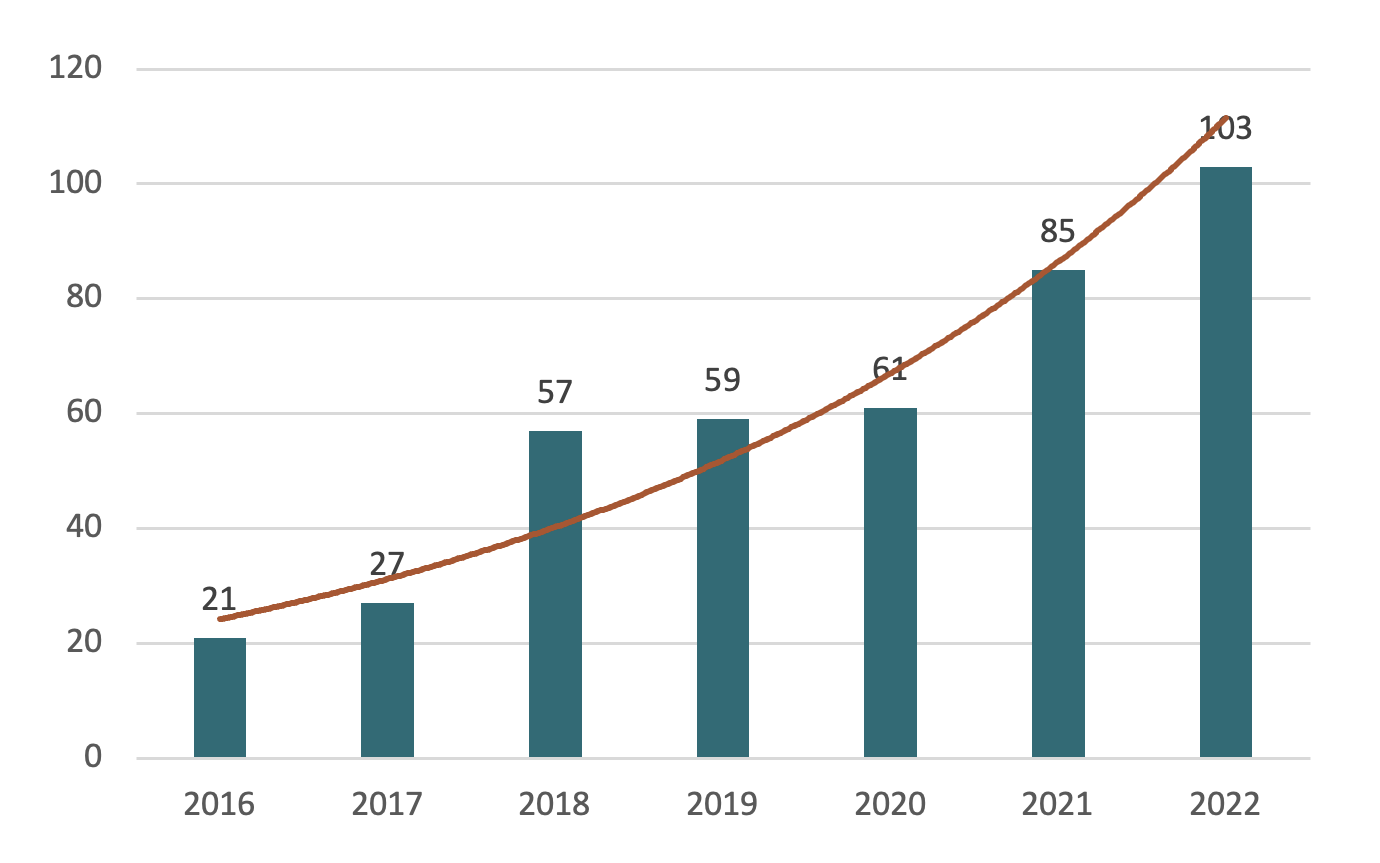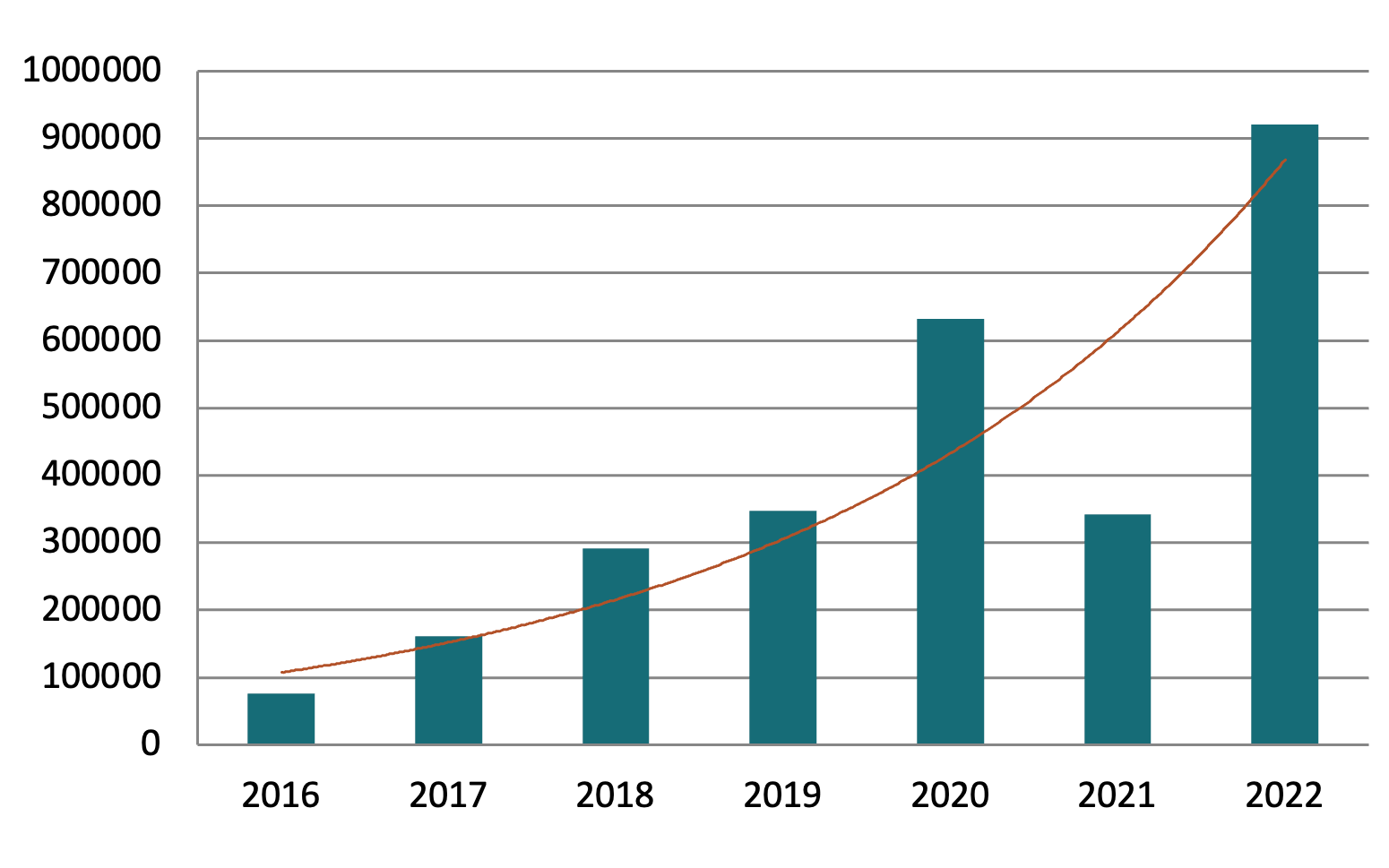The annual meeting of CSS took place on 23 March, 2023, where General Director Zsolt Boda presented the results of the previous year (see photos).
The scientific performance of CSS kept improving also in 2022.
The number of papers written by CSS researchers published in Q1 journals and ones with an impact factor

International project funding (EUR)

The number of papers in high-ranked international journals has radically grown as compared to previous years. CSS researchers published 103 papers in journals with impact factor or SCimago Q1 (see figure above). These publications not only indicate our researchers’ international competitiveness but they also influence the amount of funding from ELKH. The list of excellent publications includes:
- Neumann, Eszter: Education for a Christian nation. Religion and nationalism in the Hungarian education policy discourse. European Education Research Journal, IF 1,701.
- Hoffmann, Tamás: Illegal Legality and the Façade of Good Faith. Migration and Law in Populist Hungary. Review of Central and East European Law, Vol. 47. Q1
- Papp, Zsófia: Environmental attitudes, environmental problems and party choice. A large-N comparative study. Political Geography, IF 3,62
- Herke, Boglárka – Janky, Béla: The Role of the Deservingness Criteria in the case of Single Mothers’ Perceived Welfare Deservingness in Hungary. Journal of Social Policy, 2021. December 6. pp. 1–21. FirstView, 3.269 D1
- Kutasi K, Koltai, Júlia, Szabó-Morvai Á, Röst G, Karsai M, Biró P, Lengyel B: Understanding hesitancy with revealed preferences across COVID-19 vaccine types. Scientific Reports 12 : 1, Paper: 13293, 10 p., IF 4,38
- Husz, Ildikó – Kopasz, Marianna – Medgyesi, Márton: Social Workers’ Causal Attributions for Poverty: Does the level of spatial concentration of disadvantages matter? Social Indicators Research 162. 1069–1091, Q1, IF: 2.935
Journal articles are not the only type of publications though; CSS researchers published 11 books with prestigious international publishers, of which Csongor István Nagy’s monograph entitled Global Values and International Trade Law stands out, published by Palgrave Macmillan. Other important titles include The main lines of the jurisprudence of the Hungarian Constitutional Court. 30 case studies from the 30 years of the Constitutional Court (1990 to 2020), edited by Fruzsina Gárdos-Orosz and Kinga Zakariás; and Paradoxical Right-Wing Sexual Politics in Europe, edited by Judit Takács et al, and published by Springer
The number of publications in Hungarian is also higher than in previous years: 490 articles, papers, and books written by CSS researchers were published in total, with special focus on the 44 monographs and volumes of papers.
According to the publishing policy of CSS, the books funded by the Centre must be open access within a short period of time. This principle is accepted by publishers therefore the above books are already or will shortly be available on the website of CSS or its institutes.
CSS has increasingly been successful in applying for national and international funding for projects, and for now, these resources make up a third of its total budget. The central funding from Eötvös Loránd Research Network (ELKH) considers both the publication performance and success in applications for funding. CSS takes a middle place among ELKH research institutes as to project funding per researcher, which is remarkable considering the typically lower budget of social science and humanities projects than that of life sciences. Therefore, the middle place of CSS in that area is in fact outstanding.
In 2022, 12 project proposals submitted to NRDI (National Research, Development, and Innovation Office) OTKA by researchers of CSS received 361 million HUF; Júlia Koltai won a new ‘Lendület – Momentum’ project, and CSS is now a member of two National Laboratories: National Laboratory for Artificial Intelligence, and National Laboratory for Health Security. CSS also successfully applied for international funding last year as several proposals submitted in 2021 or on the waiting list received funding. Among others, EU research-funded new projects are Light (Litigating change: training lawyers on the EU rule of law acquis), REDIRECT (The REpresentative DIsconnect: diagnosis and strategies for RECTification), and Polarvis (Visual Persuasion in a Transforming Europe). Zsolt Körtvélyesi won MSCA Fellowship, and an ERC Consolidator Grant project is to be launched with the title Welfare Experiences, whose Hungarian part is led by Dorottya Szikra. The amount of funding from EU funds doubled compared to the previous year.
CSS disseminates its research results in conferences organised by its researchers for the Hungarian and international academic community and through other channels of science communications. Our headquarters, the House of Human Sciences (HTK) provides an ideal environment for events, although most of these were held in a hybrid form due to the pandemic. International conferences were organised on topics like the new directions of regional development, the labour sociological challenges of the digital platform economy, the issues of the historical constitution, the opportunities for non-territorial autonomy of national minorities, and democratic innovations. The non-academic public had the opportunity to be informed of the work of CSS researchers in the lectures of the Researchers’ Nights, book launches, and other events open to the general public. Our website and social media channels also provide a good resource for information, as well as our highly popular podcast series launched two years ago, which reflects on hot social topics, and present the results of the research projects.












